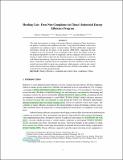Herding Cats: Firm Non-Compliance in China’s Industrial Energy Efficiency Program
Author(s)
Karplus, Valerie Jean; Shen, Xingyao; Zhang, Da
DownloadAccepted version (1.054Mb)
Open Access Policy
Open Access Policy
Creative Commons Attribution-Noncommercial-Share Alike
Terms of use
Metadata
Show full item recordAbstract
We study firm responses to a large-scale energy efficiency program in China, focusing on the quality of reporting and compliance outcomes. Using statistical methods to detect data manipulation in compliance reports, we find evidence that firms deliberately exaggerated performance during the first phase of the program (2006-2010), suggesting the high compliance rate was overstated. In its second phase (2011-2015), the number of firms in the program expanded by an order of magnitude, and the compliance rate decreased. We develop a simple model to show how the observed increase in non-compliance is consistent with reduced misreporting. Statistical tests find no evidence of manipulation in the second phase. Larger firms, especially those not controlled by the state, and firms in cities with relatively low growth were more likely to report non-compliance, which suggests a role for state control and local protectionism in shaping compliance decisions. Based on our findings, we offer several lessons for future program design.
Date issued
2020-10Department
Sloan School of Management; Massachusetts Institute of Technology. Institute for Data, Systems, and SocietyJournal
Energy Journal
Publisher
International Association for Energy Economics (IAEE)
Citation
Karplus, Valerie J. et al. "Herding Cats: Firm Non-Compliance in China’s Industrial Energy Efficiency Program." Energy Journal 41, 4 (October 2020): dx.doi.org/10.5547/01956574.41.4.vkar © 2018 International Association for Energy Economics
Version: Author's final manuscript
ISSN
0195-6574